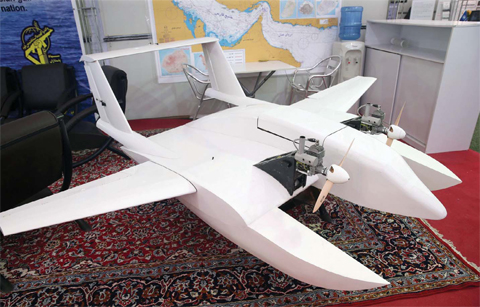US 'troubled' by spying sentence of Iranian American
 TEHRAN: Photo shows what Iran’s elite Revolutionary Guards referred to as ‘suicide drone’ - capable of delivering explosives to blow up targets at sea and on land. — AFP
TEHRAN: Photo shows what Iran’s elite Revolutionary Guards referred to as ‘suicide drone’ - capable of delivering explosives to blow up targets at sea and on land. — AFPTEHRAN: Iran's elite Revolutionary Guards said yesterday they had developed a "suicide drone" capable of delivering explosives to blow up targets at sea and on land. The new drone is primarily for maritime surveillance and "has not been designed to be armed with missiles," the Tasnim news agency, which is close to the Guards, reported. "(But) it can carry heavy payloads of explosives for combat missions to launch suicide attacks. "Flying at a high cruising speed near the surface of the water, the aircraft can collide with the target and destroy it, either a vessel or an onshore command centre." Tasnim said the drone was designed to fly as low as two feet (half a meter) above the water at a speed of around 250 kilometers per hour but could reach an altitude of 900 metres.
As with previous drone announcements by Iran, the news agency released photographs of the aircraft on the ground, but no footage of it flying. "It has an advanced military camera with the capability of being used at night and during the day, as well as the possibility of being used in damp sea conditions," Tasnim said. Earlier this month, the Revolutionary Guards claimed to have produced a new attack drone, the Saegheh (Thunderbolt), by reverse-engineering a US Central Intelligence Agency RQ-170 Sentinel drone that was captured in December 2011. Iran claimed one of its cyber warfare units took control of the US drone and landed it safely, while the US says a technical problem caused it to crash. The Guards released pictures of the Thunderbolt, but no footage of it in flight.
US 'troubled'
In another development, United States said it was "troubled" by Iran's reported 18-year sentence of an Iranian American accused of spying, a week after two other dual citizens were sentenced amid tense bilateral relations. In an interview from a prison in northeast Iran with the Los Angeles Times, Gholamrez Reza Shahini, 46, said he was being sent to prison for "collaborating with a hostile government," a reference to the United States. The San Diego man, who goes by the nickname Robin, said he was arrested July 11 when he was visiting his mother and other family members in Iran.
"We are troubled by reports that Robin or Raisa Shahini, a person reported to be a US citizen, may have been convicted and sentenced to 18 years in prison," said State Department spokesman John Kirby."We reaffirm our calls on Iran to respect and protect human rights and fundamental freedoms, cease arbitrary and politically motivated detentions, and ensure fair and transparent judicial proceedings in all criminal prosecutions, consistent with its laws and its international obligations." Last week, an Iranian American businessman and his 80-year-old father were sentenced to 10 years in an Iranian prison for espionage, prompting the US State Department to demand their release.
Siamak Namazi and his father Baquer Namazi were sentenced "for espionage and collaboration with the American government," said Iranian prosecutor-general Abbas Jafari Dolat-Abadi, according to the Fars news agency. In response to the US demand for their release, Iran said it would not accept US "interference" in its internal affairs. The sentencing of Iranian Americans comes in the context of tensions between the US and Iran over the normalization of financial relations between the Islamic republic and the international community following a nuclear agreement. The historic deal between world powers and Iran, which came into force in January, saw a partial lifting of sanctions in exchange for curbs on Tehran's nuclear program.- Agencies










